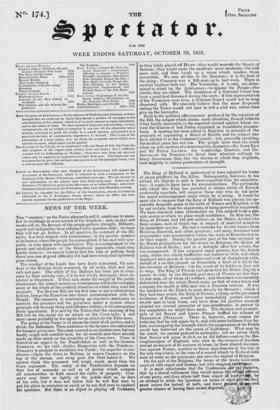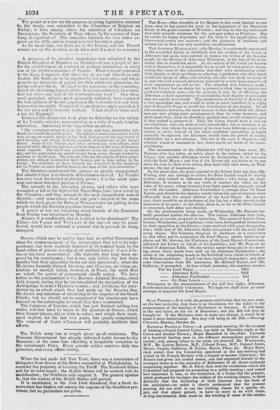The King of Holland is understood to have rejected the
terms of peace proffered by the Allies. Subsequently, however, to his refusal, his Majesty is said to have requested time for considera- tion : it ought to have been for reconsideration. The pertinacity with which this King has persisted in claims which all Europe professedly repudiate, will surprise those only who do not know the secret encouragement under which he is acting. It would be most idle to suppose that the King of Holland was playing his ap-
parently desperate game in the teeth of France and England, were he not certain, from his experience, of being powerfully supported. We have obtained some information on this subject from a pri-. vate source in which we place much confidence. In May last, the King of Prussia had 100,000 soldiers on the Rhine, divided into three armies, each of which was in respect of materiel complete for immediate service. He had a contract for 23,000 horses from Holstein, Sleswick, and other quarters ; and many thousand tons ofprovender were accumulated within the walls of Ehrenbreitstein for their supply. During the greater part of the time occupied in the Dutch preparations for the attack on Belgium, the Queen of Holland was at Berlin ; and in a fortnight after her return, the war commenced. It has surprised many persons, how the Dutch army, which was wholly ineffictive and useless in 1829, and which displayed such proofs of cowardice and Want of discipline in 1830, should of a sudden present so formidable a front as it did in the late invasion of Belgium ; but the secret of its boldness does not lie deep. The King of Prussia had perm:tted his Dutch Majesty's agents to raise in the Rhenish pi ovinces of Prussia no less than 15,000 men, all of them o11 soldiers ; and these men were carefully distributed over the whole Dutch army, so that of every troop and company the fourth or fifth man was a • Prussian veteran. It was the intention of the Dutch to push directly for Brussels ; which if they had once seized, the King of Prussia, relying on the presumed feebleness of France, would haveimmediately pushed forward 80,000 men to back theni, and have from his position securely pleaded our avowed principles of non-interference, in answer to any complaints we might have made. The decision and prompti- tude of old SOULT and Louis PHILIP baffled the -scheme of FREDERICK iWILLIA111. There is, however, some reason for believing that he will again try it, and with more boldness than be- fore, encouraged by the triumph which the suppression of the Polish revolt has bestowed on the cause of legitimacy. What may be the result, we cannot pretend to anticipate; but we rather think that SOULT will come in first, as he •did before,—unless the Bo- ronzhmongers of England, who view in the success of freedom abroad an earnest of its success at home, by their absurd declama- tion against France, contrive to throw impediments in the way of the only step which, in the ease of a second attack by Holland with such an army as she possesses, can save the capital of Belgium.
On the part of the Belgians, the terms of the treaty have been. received with regret and dismay, but with resigned-10 1. It is most unfortunate that the Conference ..„citelfot, ve,
that by a liberal settlement they would insure ent
of one party, and thus attain half their object air )east an' attempt to settle the !question on terms. or-tigid ,tuAitlklihey
must insure the hatred of both, and leave 059,ter and greater chance of having their .award disputed The projet of a law for the purpose of giving legislative sanction -to the treaty, was submitted to the Chambers of Belgium on Friday ; it bore among others the signature of CHARLES DE BROUKERE, the Secretary of War, whom, by the cession of Lim- burg, it expatriates ! The armistice between the two states ex- pired on the 25th, and no formal renewal has taken place.
In the mean time, our fleets are in the Downs, and the French armies are on the frontier, ready for a start if a start be necessary































 Previous page
Previous page